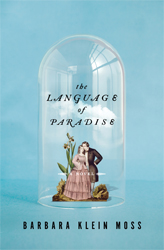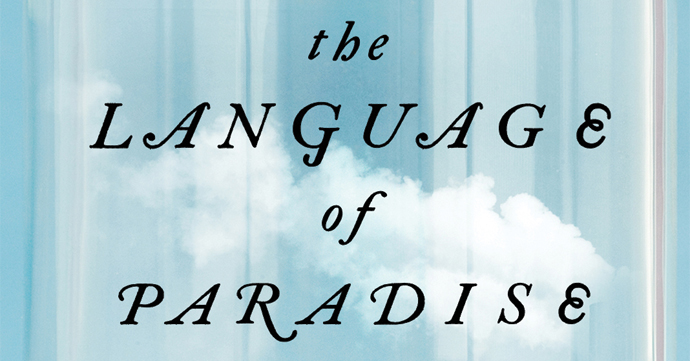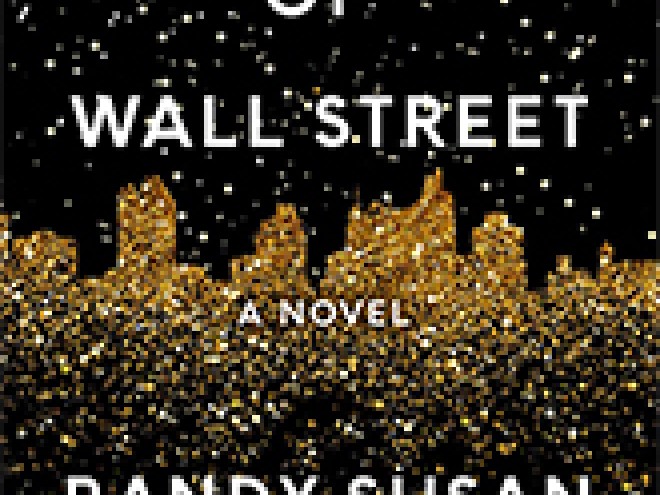Intrigued by a nefarious Jewish character in Barbara Klein Moss’s debut novel, Jewish Book Council sought to learn more about the sympathetic serpent in The Language of Paradise. Between comparing outrageous exegeses on the story of Eden and swapping slip-ups in transitioning between writing in arcane language and living in the modern world, the author offered insight into the Jewish experience of nineteenth-century New England and the complexities of casting a Jewish villain.
 Nat Bernstein: I’m curious as to where this novel started. What came to you first: the concept, the characters, or the story — or an isolated scene?
Nat Bernstein: I’m curious as to where this novel started. What came to you first: the concept, the characters, or the story — or an isolated scene?
Barbara Klein Moss: I had an idea in my mind for years to write about a character obsessed with finding the first language. I’ve been writing about Eden for a long time: my earlier publication was a collection of contemporary stories on the theme of Eden. The part of the Genesis story that fascinates me the most is Adam naming the animals — which is dispensed with in a line, this complex subject: God passed the animals before Adam and he gave them names, and then he named his wife — and I was always intrigued by that, and I thought there were fictional possibilities there. At some point the idea came to me that there would be a clergyman obsessed with finding the “golden tongue,” and his wife who was a visionary, a painter who tried to capture his vision in her painting.
NLB: We learn very little of Leander Solloway’s “true character” other than that he is a Jew, which is shared as a statement rather than an insightful soliloquy — in fact, the only reflections on his identity or religious heritage in the novel are supplanted by Gideon’s (and later Sophy’s) passing musings, observations, assumptions, and stereotypes. Why make this character Jewish? And, once that choice was made, why not delve into it further?
BKM: When I first created the character, when he came to me, I didn’t know he was Jewish; it was as I wrote him that I discovered it — it was as much of a surprise to me as to anyone. (My editor, who is also Jewish — as I am — was very alarmed by this, and she said, “But if he’s the Serpent, the bad guy in this story, it might not be a good idea to make him Jewish!”) Yet it seemed so clear to me, that this was why he was— first of all, I have never seen him as a Serpent, I should say that — the way he is. When Leander first tells Gideon that he’s a Jew, he says, “So now you will understand the nature of my so-called magic. If the world regards you always as a son of the circumcised you have a choice: you can live your life within the walls they have built around you, consorting only with your own kind, or you can can become a shape-shifter.” And he does become a shape-shifter. I think that Leander is the only modern man in the novel. He is in a sense a psychologist: he learns how to “pitch his tent in other men’s minds,” as he says, and to “make himself at home in their ghettos” — what he means by that is to get to know them in such a way that he becomes part of their lives for a while.
NLB: That’s interesting to think about: How different his role in the story would be if this was a story set two hundred years later.
BKM: You know, I think probably he would be considered a sage two hundred years later. I really do. He is advanced in many ways, even in his physicality: he is unashamed of who he is, he is a very sensual man, and revels in the sexual aspects of life. He is a manipulator, but you can’t always make people of your own belief system heroes — I think that’s as false as making him a villain. He has learned to manipulate to survive and he is also a sort of magician: he appears and disappears out of nowhere, in a sense, and he loses himself in other people’s lives. But I think the poignancy of Leander is that he really is looking for his own tribe. He has this deep longing to settle somewhere, to rest somewhere, and I think he’s chosen Gideon and Sophy for that reason.
NLB: I kept expecting some kind of “Hath a Jew not eyes?” outburst from Leander, and he really stayed so contained with it. He does reflect that “if you’re a Jew, you have two choices, and this is my story,” but maybe between the language and the way this character was poised, I was just waiting for a Shylock moment, you know? Because he is similarly complicated: your heart goes out to him, despite the havoc he’s wreaking on the environment he’s inserted himself into.
BKM: For me, the Shylock moment is when Parson Entwhistle comes to tell them about the rumors that have started in the town, and the rumors have a clear anti-Semitic tinge to them — to the point that they’re accusing him of using the baby’s blood. And the poignancy there is that he bursts out in this almost hysterical laughter — Sophy and Gideon are appalled, they can’t imagine why he would react that way — and it’s because he knows it’s found him again, this pernicious thing. He knows he can never really escape.
NLB: In reading the novel, I began to suspect Leander’s heritage long before it is ever confessed, largely because his character reminded me so much of Jewish villains in Grimms’ more obscure stories. So it interested me that you set his origin in Kassel, and even named it as the hometown of the Brothers Grimm. Was this a nod to their depiction of Jews, brought in again in The Language of Paradise—or was that sheer coincidence?
 BKM: That honestly was sheer coincidence. I just happened to know someone who had come from Kassel, and when I discovered it was from the Brothers Grimm it appealed to me. Leander is a storyteller himself and a mythical figure to people of the town. He has a magical quality. I wasn’t relating it to his supposed villainy.
BKM: That honestly was sheer coincidence. I just happened to know someone who had come from Kassel, and when I discovered it was from the Brothers Grimm it appealed to me. Leander is a storyteller himself and a mythical figure to people of the town. He has a magical quality. I wasn’t relating it to his supposed villainy.
NLB: There are moments when both Gideon and Sophy see his actions or something he said as a confirmation of what they had known or had assumed about Jews. Did you have any hesitations about casting the Jews in the stereotypes of his time?
BKM: For Gideon, who’s never known any Jews, there is a foreignness to his friend, a kind of exoticism. And this fascinates him; he’s never met someone European before! He’s a boy from a rather obscure village, and so a lot of this is just pure exoticism and fascination. Sophy, in the end, sees Leander as something of a hero for her: he saw her, he saw her art, he was a worldly man — which for her is not a negative thing.
NLB: I’m intrigued by the correspondence between Parson Entwhistle and the German rabbi. Did you do much research into this? How likely would an exchange between New England Protestant and European Jewish clergymen have been? Would a rabbi in Kassel (was there one?) have had sufficient command of English to reply?
BKM: There is some invention in this, but I didn’t think it was totally improbable that they would communicate. There was a synagogue in Kassel at the time, and they’re both scholarly men — I thought it was a real possibility. Entwhistle, for his era, is extremely liberal. He doesn’t share the prejudices that many in the village do. This was a time when there was a certain enlightenment among clergyman: they weren’t all stern Calvinists like Hedge.
NLB: Personally, I really took to Entwhistle. I thought he was such a quiet hero in the story.
BKM: He really was! I almost wish he could have had a bigger role. He had a feeling for Sophy that was more than he could express; he saw who she was.
NLB: Did you enter into a writer’s equivalent of method acting? Once you sat down with the book, were you in the space of the nineteenth century, and was it hard to break out of that when you left your writing desk?
BKM: Yes, that is really what it was like. I submerged myself in that world so deeply that I could hear the characters’ voices in my head. It was actually hard for me not to use the nineteenth century grammar and usage afterwards! I found myself using “vexed” as an adjective in a modern story I was writing, and I realized that it was still strong in my head, this nineteenth century world.
Nat Bernstein is the JBC Network Coordinator at the Jewish Book Council and an F’07 graduate of Hampshire College.
Read the Barbara Klein Moss’s follow-up to the conversation here!
Related Content:
- Jessica Cohen: The Hebrew Translator on Translation
- Janis Cooke Newman: 2015’s Top 5 Historical Fiction Novels
- Leslie Maitland: Borrowed Words
Nat Bernstein is the former Manager of Digital Content & Media, JBC Network Coordinator, and Contributing Editor at the Jewish Book Council and a graduate of Hampshire College.





